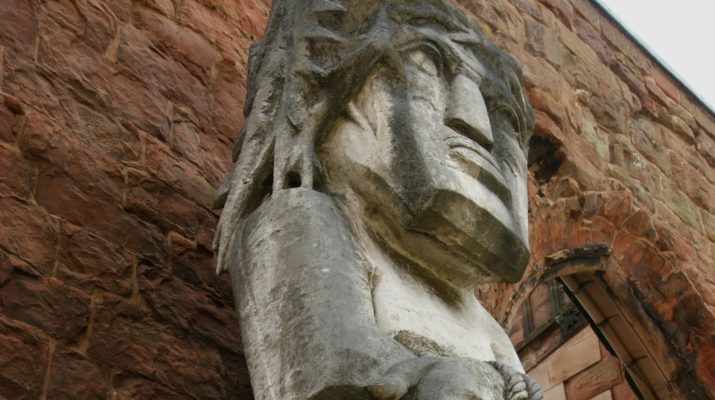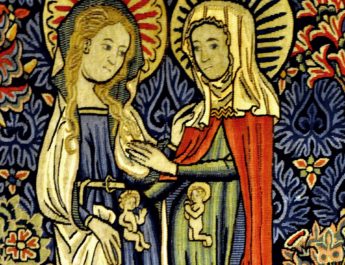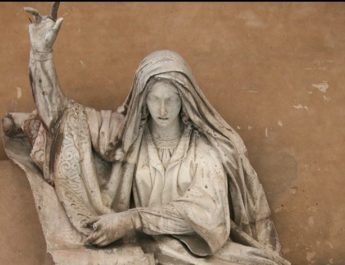Colossians 1:11-20
Reign of Christ C
11 May you be made strongA with allB the strengthC that comes from his gloriousD power,E
A “made strong” = dunamoo. Related to “strength” in v11. 2x in NT. From dunamai (see note C below). This is to make strong or win strength, empower.
B “all” = pas. This is all or every.
C “strength” = dunamis. From dunamai (to be able, have power or ability). This is might, strength, physical power, efficacy, energy, and miraculous power. It is force literally or figuratively – the power of a miracle or the miracle itself.
D “glorious” = doxa. From dokeo (to have an opinion, seem, appear, suppose; a personal judgment; to think); from dokos (opinion). This is literally something that evokes a good opinion – something that connects to our understanding of intrinsic worth. The ultimate expression of this is, of course, God and God’s manifestation. So, this is opinion, honor, and dignity, but also praise, glory, renown, and worship.
E “power” = kratos. 12x in NT. This is strength, power, or dominion. It is vigor in a literal or figurative sense or power that is exercised.
so that you may have all enduranceF and patience,G joyfullyH
F “endurance” = hupomone. From hupo (by, under, about) + meno (to stay, remain, wait, await, continue, abide). This is properly to remain behind or remain under. It implies endurance, patience, steadfastness, and waiting in hope.
G “patience” = makrothumia. 14x in NT. From makros (long, long lasting) {from mekos (length); probably related to megas (great or large)} + thumos (passion, wrath; actions emerging from passion or impulse) {from thuo (to rush along, breathe violently, offer sacrifice)}. Properly, this is long-passion or long-suffering – one who waits the needed amount of time before expressing anger. This is also patience, perseverance, and fortitude.
H “joyfully” = chara. From chairo (to rejoice, be glad or cheerful; a greeting); from char– (to extend favor, lean towards, be inclined to be favorable towards). This is joy, delight, gladness. Can be understood as the feeling you get when you are aware of grace.
12 giving thanksI to the Father,J who has enabledK you
I “giving thanks” = eucharisteo. Related to “joyfully” in v11. From eu (good, well, well done, rightly) + charis (grace, kindness, favor, gratitude, thanks; being inclined to or favorable towards – leaning towards someone to share some good or benefit; literal, figurative, or spiritual; grace as abstract concept, manner, or action); {from chairo (see note H above)}. This is giving thanks, being thankful. It is a recognition that God’s grace is good and actively showing gratitude. It can also be used for saying grace before eating. This is where “eucharist” comes from.
J “Father” = Pater. This is father in a literal or figurative sense. Could be elder, senior, ancestor, originator, or patriarch.
K “enabled” = hikanoo. 2x in NT. From hikanos (sufficient, suitable, adequate, competent, ample); from hiko or hikneomai (to reach, come to, attain) OR from hiketes (a suppliant). This is to be sufficient, qualified, able.
to shareL in the inheritanceM of the saintsN in the light.O
L “share” = meris. From meros (a part or share, portion); from meiromai (to get one’s allotment or portion). This is portion, share, district. It can be literal or figurative.
M “inheritance” = kleros. 12x in NT. Perhaps from klero (casting a lot) or from klao (to break in pieces as one breaks bread). This lot, portion, heritage. It is that share assigned to you. It could also refer to a lot used to determine something by fate, chance, or divine will.
N “saints” = hagios. From hagnos (holy, sacred, pure ethically, ritually, or ceremonially; prepared for worship, chaste, unadulterated, pure to the core; undefiled by sin; figurative for innocent, modest, perfect). God is totally different from humanity and thus set apart. That which is consecrated to worship God (elements of worship) or to serve God (as the saints) are holy because they are now set apart for God’s purposes. Holy because important to God. This is sacred physically, pure. It can be morally blameless or ceremonially consecrated.
O “light” = phos. From phao (to shine or make visible, especially with rays of light); from the same as phaino (to bring light, cause to appear, shine, become visible or clear). This is light, a source of light, fire, or radiance. This is light with specific reference to what it reveals. It is luminousness whether natural or artificial, abstract or concrete, literal or figurative.
13 He has rescuedP us from the powerQ of darknessR
P “rescued” = rhuomai. 18x in NT– including from the Lord’s prayer “deliver us from evil”. Related to eruo (to draw or drag) OR related to rheo (to flow, overflow). This is to rescue or set free. It is to deliver from danger, to snatch up.
Q “power” = exousia. From exesti (to be permitted or lawful); {from ek (out, out of) + eimi (to be, exist)}. This is power to act or weight. It especially denotes moral authority or influence. It can mean domain, liberty, freedom, capacity, mastery, right, force, or strength.
R “darkness” = skotos. Perhaps from the base of skia (shadow, thick darkness, outline; figurative for a spiritual situation that is good or bad). This is darkness literal or figurative – as moral or spiritual darkness, sin and what comes from it. This can also mean obscurity.
and transferredS us into the kingdomT of his belovedU Son,V
S “transferred” = methistemi. 5x in NT. From meta (with, among, after, beyond) + histemi (to make to stand, place, set up, establish, appoint, stand by, stand still, stand ready, stand firm, be steadfast). This is to change, remove, transfer, dismiss, carry away, seduce.
T “kingdom” = basileia. From basileus (king, emperor, sovereign); probably from basis (step, hence foot; a pace); from baino (to walk, to go). This is kingdom, rule, authority, sovereignty, royalty, a realm.
U “beloved” = agape. From agapao (to love, take pleasure in, esteem; to prefer). This is love, goodwill, benevolence. It is God’s divine love or human love that mirrors God’s love.
V “Son” = Huios. This is son, descendant – a son whether natural born or adopted. It can be used figuratively for other forms of kinship.
14 in whom we have redemption,W the forgivenessX of sins.Y
W “redemption” = apolutrosis. 10x in NT. From apo (from, away from) + lutroo (to redeem, liberate, release because ransom was paid in full; figuratively, returning something or someone to their rightful owner) [from lutron (ransom, the money used to free slaves; also a sacrifice of expiation; figurative for atonement); from luo (to loose, release, untie; figuratively, to break, destroy, or annul; releasing what had been withheld)]. This is redemption, deliverance, or release particularly with the notion of ransom paid – a buying back what had been lost.
X “forgiveness” = aphesis. 17x in NT. From aphiemi (to send away, release, abandon, lay aside, forgive); {from apo (from, away from) + hiemi (to send, to go)}. This is sending away – a release or letting go. So, it can be releasing someone from debt, slavery, or some other obligation – thus, freedom or liberty. Figuratively it can mean to pardon as releasing from the debt of sin.
Y “sins” = hamartia. Related to “share” in v12. From hamartano (to miss the mark, do wrong, make a mistake, sin); {from a (not) + meros (see note L above)}. Literally, this means not having one’s share or portion – like not receiving inheritance or what was allotted to you. This word means missing the mark so it is used for guilt, fault, and acts of sin.
15 He isZ the imageAA of the invisibleBB
Z “is” = eimi. Related to “power” in v13. See note Q above.
AA “image” = eikon. From eiko (resemble, be like) OR perhaps related to eiko (to submit, give way, be weak, yield). This is a likeness such as an image, statue, or other representation. It implies a prototype that is being mirrored – a replication rather than a shadow. It can be an image in a figurative sense as well. This is where the word “icon” comes from.
BB “invisible” = aoratos. 5x in NT. From a (not, without) + horatos (this is visible, something that one can see); {from horao (to see, perceive, attend to, look upon, experience; to stare at, which implies clear discernment; by extension, attending to what was seen and learned; to see, often with a metaphorical sense, which can include inward spiritual seeing)}. This is something that one cannot see – something invisible. Figuratively, it could refer to the reality of the divine.
God,CC the firstbornDD of all creation,EE
CC “God” = Theos. From Proto-Indo-European origins, meaning do, put, place. This is God or a god in general.
DD “firstborn” = prototokos. 8x in NT. From protos (what is first, which could be the most important, the first in order, the main one, the chief); {from pro (before, first, in front of, earlier)} + tikto (to beget, bring forth, produce). This is firstborn or oldest. Figuratively, it can also mean pre-eminent.
EE “creation” = ktisis. 19x in NT. From ktizo (to build, create, form, shape; God’s acts of creation); probably akin to ktaomai (to get, purchase, possess). This is creation, creature, or ordinance. It is also used for when a city is founded and creation as origin.
16 for in him all things in heavenFF and on earthGG were created,HH things visibleII and invisible,
FF “heaven” = ouranos. May be related to oros (mountain, hill) with the notion of height. This is the air, the sky, the atmosphere, and heaven. It is the sky that is visible and the spiritual heaven where God dwells. Heaven implies happiness, power, and eternity.
GG “earth” = ge. This is earth, land, soil, region, country, the inhabitants of an area.
HH “created” = ktizo. Related to “creation” in v15. 15x in NT. See note EE above.
II “visible” = horatos. Related to “invisible” in v15. 1x in NT. From horao (see note BB above). This is visible – something that can be seen.
whether thronesJJ or dominionsKK or rulersLL or powersMM—all things have been created through him and for him.
JJ “thrones” = thronos. Probably from thanos (bench); from thrao (to sit). This is throne or seat – the place where the king sits. So, it is used figuratively to mean power, dominion, or a potentate. This is where the word “throne” comes from.
KK “dominion” = kuriotes. 4x in NT. From kurios (a respectful address meaning master or sir. It refers to one who has control or power greater than one’s own. So, it was also applied to God and Jesus as Master or Lord); from kuros (authority, supremacy). This is lordship, mastery, or authority. It refers to the power over a region or a ruling within a heavenly hierarchy. It can refer to rulers or government.
LL “rulers” = arche. From archomai (to begin or rule); from archo (to rule, begin, have first rank or have political power). Properly, this is what is first. In a temporal sense, that is beginning or origin. It can also refer to the one who ranks first, i.e. king or ruler. So, it can also be magistrate, power, or principality. It can be used more generally for what is preeminent.
MM “powers” = exousia. Same as “power” in v13. See note Q above.
17 He himself is before all things, and in him all things hold together.NN 18 He is the headOO of the body,PP the church;QQ
NN “hold together” = sunistemi. Related to “transferred” in v13. 16x in NT. From sun (with, together with) + histemi (see note S above). This is to establish, exhibit, demonstrate, stand together, prove.
OO “head” = kephale. This is head or chief. It can be a literal head or, figuratively, a ruler or lord. It can also refer to a corner stone. This is where the word “cephalic” comes from.
PP “body” = soma. Perhaps from sozo (to save, heal, rescue); from sos (safe, well, rescued). This is body or flesh. It can be body in a literal or figurative sense (as the body of Christ). This is where the word “somatic” comes from.
QQ “church” = ekklesia. From ek (from, out from) + kaleo (to call by name, invite, to name, bid, summon, call aloud) {related to keleuo (to command, order, direct); from kelomai (to urge on)}. This is properly a calling out or an assembly. It was used to refer to a church.
he is the beginning,RR the firstborn from the dead,SS so that he might comeTT to have first placeUU in everything.VV
RR “beginning” = arche. Same as “rulers” in v16. See note LL above.
SS “dead” = nekros. Perhaps from nekus (corpse). This is dead or lifeless, mortal, corpse. It can also be used figuratively for powerless or ineffective. It is where the word “necrotic” comes from.
TT “might come” = ginomai. This is to come into being, to happen, become, be born. It can be to emerge from one state or condition to another or is coming into being with the sense of movement or growth.
UU “have first place” = proteuo. 1x in NT. From protos (what is first, which could be the most important, the first in order, the main one, the chief); {from pro (before, first, in front of, earlier)}. This is having preeminence, having the first rank, being a chief influence.
VV “everything” = pas. Same as “all” in v11. See note B above.
19 For in him all the fullnessWW of God was pleasedXX to dwell,YY
WW “fullness” = pleroma. 18x in NT. From pleroo (to fill, make full or complete; properly, filling something up to the maximum extent or induvial capacity; used figuratively for furnish, influence, satisfy, finish, preach, perfect, and fulfill); from pleres (to be full, complete, abounding in, occupied with). This is fullness, supply, completion, superabundance, or multitude.
XX “pleased” = eudokeo. Related to “glorious” in v11 & “giving thanks” in v12. From eu (see note I above) + dokeo (see note D above). This is to think well of, to be pleased or resolved. Properly, this is what someone finds good or acceptable – approving of some action or generally thinking well of.
YY “dwell” = katoikeo. From kata (down, against, throughout, among) + oikeo (to settle or be established somewhere in a permanent way, to make a home or live at home); {from oikos (house – the building, the household, the family, descendants; the temple)}. This is to live or settle on a permanent basis.
20 and through him God was pleased to reconcileZZ to himself all things, whether on earth or in heaven, by making peaceAAA through the bloodBBB of his cross.CCC
ZZ “reconcile” = apokatallasso. 3x in NT. From apo (from, away from) + katallasso (to reconcile, change, or exchange; a moment when two parties come together in reconciliation and both parties change because of it); {from kata (down, against, among) + allasso (to change, transform) {from allos (other, another; another of a similar kind or type)}. This is to reconcile – to move from one place of feeling to a new one.
AAA “making peace” = eirenopoieo. 1x in NT. From eirenopoios (making peace, a peacemaker); {from eirene (one, peace, quietness, rest, peace of mind, harmony; a common farewell among Jews (i.e. shalom) as a well-wishing that included a blessing of health and wholeness for the individual; indicates when everything that is essential is joined together properly; peace literally or figuratively; by implication, it is prosperity –not in the sense of excessive wealth, but having enough from day to day); {perhaps from eiro (to join, tie together to form a whole)} + poieo (to make, do, construct, cause)}. This is to reconcile, work for peace, harmonize.
BBB “blood” = haima. This is blood in a literal sense as bloodshed. Figuratively, it can also be used to refer to wine or to kinship (being related).
CCC “cross” = stauros. Related to “transferred” in v13 & “hold together” in v17. From the same as histemi (see note S above). This is an upright stake, cross. Literally refers to the horizontal beam of a Roman cross, generally carried by the one convicted to die.
Image credit: “Ecce Homo”” at Coventry Cathedral by Sir Jacob Epstein, 1956-1962.




